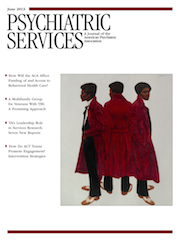Use of Intervention Strategies by Assertive Community Treatment Teams to Promote Patients’ Engagement
Abstract
Objective
This study explored the range of interventions and the use of more intrusive techniques by staff of assertive community treatment (ACT) teams to promote engagement, manage problem behaviors, and reinforce positive behaviors among patients. Individual and organizational characteristics that may be associated with these practices were identified.
Methods
Between January and March 2006, clinicians (N=239) from 34 ACT teams participated in a one-time survey about their intervention strategies with patients, perceptions about the ACT team environment, and beliefs about persons with severe mental illness.
Results
Significant variation existed in the types of interventions employed across teams. The less intrusive strategies, including positive inducements and verbal guidance, were the most common. Other strategies that placed limits on patients but that were still considered less intrusive—such as medication monitoring and money management—were also common. Clinicians who reported working in more demoralized climates and having negative perceptions of mental illness were more likely to endorse leveraged or intrusive interventions.
Conclusions
The findings of this study suggest significant variation across teams in the use of intervention strategies. Both perceptions of a demoralized organizational climate and stigmatizing beliefs about mental illness were correlated with the use of more intrusive intervention strategies. Future research on the role and appropriateness of more intrusive interventions in mental health treatment and the impact of such interventions on patient outcomes is warranted.



